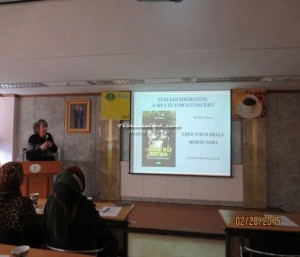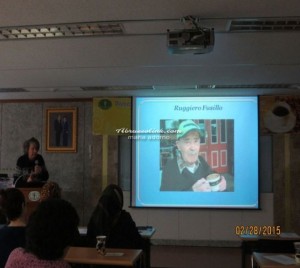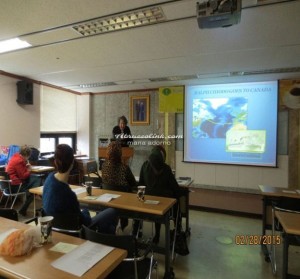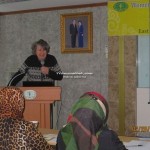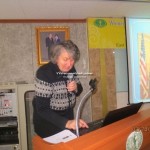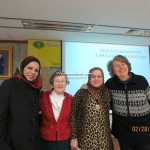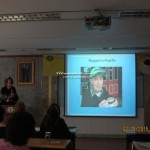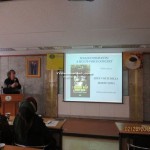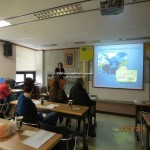Italian Migrants: A Multi-Voice Concert
Prof. Maria Adorno’s Special Lecture at WFWP-IWK INTERNATIONAL WOMEN IN KOREA
Saturday, Feb. 28, 2015 Lovely ladies! Our February Coffee Morning welcomed a favorite speaker, Prof. Maria Adorno, who presented a panorama of the worldwide itineraries of several of her country’s citizens as they sought a new life outside Italy. Titled “Italian Migrants: A Multi-Voice Concert”, Maria’s well-researched talk was filled with emotion, passion and song, and was even interwoven with references to her own life as a student and teacher in several countries. We armchair travelers journeyed along with these Italian emigrants as they made their way to other parts of Europe, North America, Australia, Africa, China and, happily for us, even here to Korea.
We were first introduced to Walter Basso, author of the book “The Two Faces of the Black Death”, whose father had immigrated to Belgium to work as a miner. Walter, too, as well as his Uncle Olindo, became miners there. Life was hard in Charleroi, Belgium, where the entire landscape was covered in black soot. Even though the miners were given a bowl of milk every day in what was then thought to be a way to prevent their getting the “patient black death’ from the coal dust they breathed in the mines, that is, the disease called silicosis, and although they were given a medical checkup every six months, Walter eventually succumbed to this disease. In fact, Walter suffered from silicosis for 31 years after returning to Italy before it led to his death. A more tragic fate awaited Uncle Olindo, who was killed along with more than 200 other miners, in a horrific mining accident in Marcinelle, Belgium, in 1956. The bodies of these miners were then transported to the cathedral in Pescara, Italy. To her great surprise, Maria recently learned that her life had intersected with the life of these miners, since Maria had been baptized in the same cathedral where the miners awaited burial in her hometown of Pescara.
We next followed Ruggiero Fusillo as he travelled from Italy to the far distant country of Australia after World War II, where he worked for many years in Melbourne. There, he mingled almost exclusively with his Italian friends who had also come from the same part of his country, playing card games with real Italian cards, attending new migrants’ meetings with them, and meeting them on Sundays after Mass. His son Archimede has chronicled Ruggerio’s life in his new country, where the first generation of immigrants contributed enormously to their new society through their hard work, but who preferred to enjoy the company of their friends from the “old country” more than to make new friends from their adopted country of Australia. Archimede wrote in his memories of his father that the members of that first generation had gradually become isolated from friends and family as they aged and were no longer able to get out and about due to their limited physical capacities. Still, they had been the pioneers who had guaranteed a good quality of life for their descendents in their new homeland.
After a musical interlude, a spoken poem about the Italian city of Genoa, we were introduced to the “Piano Man”, Mr. Sante Auriti. From his birthplace in the very small town of Orsongna in central Italy, he had gone to Germany, where he worked in a textile factory. We listened to an emotion-filled song from his native Abruzzo, Vola Vola, which let us feel the longing he must have had for his region. Arriving in New York City in 1979, he met an Orsogna compatriot who helped him get his first job in the factory in Queens where the legendary pianos of Steinway and Sons were made. He found many workers from his hometown there, excelled at woodworking and soon learned “almost everything about manufacturing a piano.” His skills as a craftsman and his love for his work made him the master piano case maker he is today, and in February of 2014 you might have seen him in the store windows of the famed Steinway Hall on posh 57th St. in Manhattan, constructing a hand carved piano case, the wooden outside of a piano that holds the strings and hammers within. He even welcomes famous musicians and university scholars from around the world who come to see him at work.
We next met Mr. Ralph Chiodo, as did Maria last summer, when she returned to Italy, after she had written about him for a lecture. At the age of 14, clutching his cardboard suitcase, Ralph travelled by steamship with his family to New York. Helped along the way by several kind and generous people, he finally arrived in Halifax and later settled in Toronto. After attending a vocational school to continue his studies to become a mechanic, Ralph at last became very successful and now has a chain of 76 service stations across Ontario. Ralph is most proud, however, of the Pier 21 Migrants’ Museum in Halifax, part of which is dedicated to his family’s experience as migrants there.
Maria then shared with us, in precious photos and song, part of her own story of growing up in Pescara and of her course as a student and teacher, studying languages in England and Montreal, becoming a wife and mother, and, in 2008, winning a highly competitive exam for Italian teachers of foreign languages, which let her journey to Korea to meet us.
The final Italian migrant whose remarkable story was being told did us the great honor of appearing in person to share his testimony with us. Father Marino Bois was born in northern Italy in the middle of World War II and, at 16, had prayerfully decided to become a Salesian Brother, working actively in society to help young and poor people gain a better life through prayer, study and work. Father Marino was sent to Korea in 1963, learned Korean, and has seen the country develop greatly, as did his school, which trained young boys to manufacture items right there in the school. From 1990-1992 he was sent to Africa, to teach in Guinea and Sudan. After five years back in Seoul, he was assigned to China from 1997 until 2013. That he had also learned Chinese was apparent, since he spoke it fluently during our Coffee Morning, talking with the mother of one of our members. Since 2013 he has been back at his beloved school in Seoul, which has expanded and has received much high technology equipment from an alumnus. Father Marino is a thoughtful and modest man who has dedicated his life to helping young students develop the skills they need to live well in their societies in the many countries in which he has lived and taught.
We thank Maria for this world tour, showing the fruitful lives of the migrants from her homeland and for introducing us to Father Marino. We are also very grateful that she, too, was assigned to teach in Korea and that we could share the lives of many dedicated people through her lecture.
After a delicious light lunch prepared by the set-up team of Mrs. In Keng Brandner and Mrs. Helen Downey, under the direction of Mrs. Lucilla Gray, we read about an upcoming special holiday, International Women’s Day, and it origins. Women in the 21st century are being called to work with a motherly heart to guide men in all aspects of life, so it was important to learn the purpose and origins of this day.
Please join us on March 28 for a hands-on creative morning titled “Emerging Womanhood”, led by Prof. Amy Scott of Korean Nazarene University in Cheonan.
Until we meet again soon, all good thoughts from
Betsy Colford


